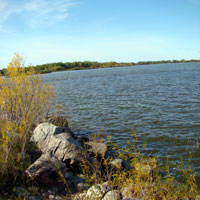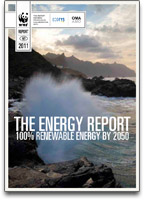
News |
- EU Parliament Moves Forward With Robin Hood Tax
- Alternatives to Canada's 2011 Budget
- Structure at Victoria Beach Ordered Removed
- Meditation and Sylvia Lakes To Be Protected
- Nearly 100% Renewable Energy by 2050
- Hydro Controversy in Nova Scotia
- Yukon Water Board Decision Upheld by Court
- Canada Water Week: Making a splash from coast to coast to coast
- Earth Hour Evolves Beyond the Hour
- Ombudsman Reviews Manitoba Hydro
- Manitoba Appoints Privacy Adjudicator
- Reduce Coal Use While Exporting Coal Pollution?
| EU Parliament Moves Forward With Robin Hood Tax | 26 March 11 |
 The European Parliament gave its overwhelming backing to introduction of a Financial Transaction Tax ( FTT ), also known as a "Robin Hood Tax", to raise money for public goods, including development and climate change.
The European Parliament gave its overwhelming backing to introduction of a Financial Transaction Tax ( FTT ), also known as a "Robin Hood Tax", to raise money for public goods, including development and climate change."The European Parliament set the world standard today by pressing ahead on an EU-wide Robin Hood Tax. This is great news. The EU alone could raise tens of billions of euros to help millions of people pushed into poverty because of bankers' greed," said Elise Ford, head of Oxfam International's EU office. The vote passed with 527 in favour to 129 opposed and 18 abstentions, The vote is non-binding but the strong call for legislation will be hard for the EU's executive Commission to ignore. The Commission will now produce a feasibility study and come forward with concrete legislative proposals. Under the proposal, the EU would push for a global FTT, but would go it alone if need be. A tax would be levied on each financial transaction by banks based in the European Union at a rate of up to 0.05pc - raising as much as €200bn annually in Europe and as much as €650bn if implemented globally. France and Germany have pushed for a global transaction tax at G20 summits in recent years but faced stiff opposition from the US and Canada. "Unfortunately, our federal [Canadian] government has not similarly embraced the policy proposal. In fact, they played an obstructionist role in efforts to discuss the FTT at the G8 and G20 meetings in Canada," stated James Clancy, Canadian president of the 340,000 member National Union of Public and General Employees (NUPGE). View March 14, 2011 NUPGE releaseView March 8, 2011 Oxfam International (EU) release View March 8, 2011 Reuters article View March 8, 2011 Guardian article View March 7, 2011 BBC News article Watch Oxfam's March 2, 2011 YouTube "Robin Hood Tax" Global Day of Action video Sources: NUPGE, Oxfam, Reuters |
|
 Print version Print version |
Top |
| Alternatives to Canada's 2011 Budget | 26 March 11 |
 In the lead up to Canada's 2011 budget various groups worked on alternative budget proposals to show alternative solutions.
In the lead up to Canada's 2011 budget various groups worked on alternative budget proposals to show alternative solutions.
"This budget slashes clean energy programs... Despite a short-term lifeline for home energy retrofits, the overall trend is a disaster. Climate change is a serious problem and this country deserves a government that takes the problem seriously," said Graham Saul, Executive Director of Climate Action Network Canada. "This budget fails to eliminate over a billion dollars in handouts to big oil. It seems like year after year, the Harper Government continues to out do itself in neglecting environmental protection and the green economy," said Equiterre Director Steven Guilbeault. "From a government that prides itself on job creation and sound economic management, it's unfortunate that Minister Flaherty's budget speech failed to recognize the job-creation potential of carbon pricing and other climate policies," said Tim Weis, director of renewable energy and efficiency policy for the Pembina Institute. View March 22, 2011 Climate Action Network releaseView March 22, 2011 Pembina Institute release View March 15, 2011 CCPA "2011 Alternative Budget" View March 15, 2011 Pembina Institute "Reducing Pollution, Creating Jobs" report View November 2011 GBC "Recommendations for Budget 2011" report View January 25, 2011 Manitoba Wildlands news item View November 30, 2010 Manitoba Willdlands news item View March 2011 Climate Action Network Canada news release Sources: Climate Action Network, Pembina Institute, Green Budget Coalition, CCPA |
|
 Print version Print version |
Top |
| Structure at Victoria Beach Ordered Removed | 22 March 11 |
 Lake Winnipeg cottage owners along Arthur Beach, who had rocks hauled in to build a retaining wall to protect their properties from shoreline erosion and storm damage, have been ordered by the Manitoba government to take parts of the wall down because it was built on public land without proper authorization.
Lake Winnipeg cottage owners along Arthur Beach, who had rocks hauled in to build a retaining wall to protect their properties from shoreline erosion and storm damage, have been ordered by the Manitoba government to take parts of the wall down because it was built on public land without proper authorization.The province, through Manitoba Conservation, issued a stop-work order March 4, 2011 because the structure had been partly built on a public road that runs along the shoreline between Lake Winnipeg and private land owned by cottagers. In the absence of any response from Victoria Beach municipality, the province ordered removal of the structures March 17, 2011. The order only applies to work on Crown land, not to work on private land. The province also said it is investigating reports of other unauthorized shoreline construction taking place at Victoria Beach, and may issue more stop-work orders. View March 18, 2010 CBC News articleView March 18, 2010 Winnipeg Free Press article View March 17, 2011 Manitoba Government release View March 5, 2011 Winnipeg Free Press article View March 4, 2011 Manitoba Government release View more information on Manitoba Wildlands View "Beach Meeting Packed" on Manitoba Wildlands View "Wall Could Block East Side Beaches" on Manitoba Wildlands Government of Manitoba, Winnipeg Free Press |
|
 Print version Print version |
Top |
| Meditation and Sylvia Lakes To Be Protected | 19 March 11 |
 Manitoba Conservation Minister Bill Blaikie has announced Meditation and Sylvia lakes in Whiteshell Provincial Park will be free from development.
Manitoba Conservation Minister Bill Blaikie has announced Meditation and Sylvia lakes in Whiteshell Provincial Park will be free from development.The two lakes were the focus of public reviews after the Tim Horton Foundation Youth Leadership Camp identified camp locations near the lakes. Meditation Lake and the surrounding area is popular sites for canoeing and fishing. It was subject to public review as a possible site for the Tim Horton's camp. The review process led the province to keep Meditation Lake as undeveloped backcountry, with a new option for Tim Horton's camp west of Sylvia Lake. The Tim Hortons camp at Sylvia Lake is expected to open in 2012. The lands adjacent to the Tim Hortons camp at Sylvia Lake, near Pinawa, Manitoba will not be developed or made accessible for new cottage development, states Blaikie. No licence has been issued yet for the camp at Sylvia Lake, based on the Manitoba Conservation online registry. "A land-use category change will be initiated in the near future," according to Blaikie. As of March 17, 2011 no regulatory changes for protect areas had been made, nor had the Whiteshell Provincial Park land use categories been updated under Manitoba's Parks Act. "We would like to see a public review and plans for the new no logging zones in provincial parks. To date they are not protected lands, and management plans are not in place. These steps would have averted the Tim Horton's complications," stated Gaile Whelan Enns, director of Manitoba Wildlands. View March 8, 2011 Province of Manitoba releaseView March 8, 2011 Winnipeg Free Press article View March 8, 2011 CBC News article View January 2011 Manitoba Wildlands Submission on proposed Sylvia Lake Tim Horton's Camp (PDF) View Manitoba Wildlands Protected Areas/Parks Reviews page Sources: Province of Manitoba, Winnipeg Free Press |
|
 Print version Print version |
Top |
| Nearly 100% Renewable Energy by 2050 | 19 March 11 |
 The Energy Report: 100% Renewable Energy by 2050, released February 3, 2010 by the World Wildlife Foundation Fund (WWF), Office of Metropolitan Architecture (OMA), and Energy Consultants Ecofys, provides a detailed report to show how currently available technology can create a global renewable energy system by 2050.
The Energy Report: 100% Renewable Energy by 2050, released February 3, 2010 by the World Wildlife Foundation Fund (WWF), Office of Metropolitan Architecture (OMA), and Energy Consultants Ecofys, provides a detailed report to show how currently available technology can create a global renewable energy system by 2050."The Energy Report shows that in four decades we can have a world of vibrant economies and societies powered entirely by clean, cheap and renewable energy and with a vastly improved quality of life. The report is more than a scenario - it's a call for action. We can achieve a cleaner, renewable future, but we must start now," said WWF Director General Jim Leape. The Energy Report outlines how 95% of global energy could be produced using current technology through:
By 2050, the global system wil have with immensely lower operating cost than "business-as-usual" fossil-based energy and related greenhouse-gas emissions reduced 80 percent from 1990 levels with obvious advantages in avoided climate change damage and adaptation costs. View February 2011 WWF, The Energy Report: 100% Renewable Energy by 2050View February 19, 2011 International Business Times article View February 3, 2011 and February 11, 2011 WWF news release View February 6, 2011 Energy Bulletin article View February 4, 2011 Grist article Source: WWF |
|
 Print version Print version |
Top |
| Hydro Controversy in Nova Scotia | 19 March 11 |
 Newfoundland's Crown-owned Nalcor Energy and Nova Scotia's Emera Inc. signed a $6.2 billion agreement on the Lower Churchill Hydro Project (LCHP) November 2010. The plan is to build two new dams on the Churchill River - Muskrat Falls and Gull Island - with combined electrical capacity of 2800 megawatts. Most of this electricity will be moved to Nova Scotia by underwater cables.
Newfoundland's Crown-owned Nalcor Energy and Nova Scotia's Emera Inc. signed a $6.2 billion agreement on the Lower Churchill Hydro Project (LCHP) November 2010. The plan is to build two new dams on the Churchill River - Muskrat Falls and Gull Island - with combined electrical capacity of 2800 megawatts. Most of this electricity will be moved to Nova Scotia by underwater cables.The Full Panel Environmental Assessment hearing for LCHP commenced March 4, 2011 and is expected to last until April 16, 2011. "There is no provincial market for this energy. This project will destroy the Churchill and its watershed just to leave a legacy for Danny Williams," said Roberta Benefiel, Grand (a.k.a.Churchill) Waterkeeper. "It is not clean, not green and sadly not needed, here or elsewhere." "If the Upper Churchill Project was Joey Smallwood's' mistake when he gave power to Québec for less than a penny a kilowatt, this project is Danny's Delusion. If this legacy project goes forward, power will be given away at a highly discounted rate for thirty-five years. It's unacceptable and the people of Labrador don't support it," said Sierra Club Canada campaigner Bruno Marcocchio. The NunatuKavut, formerly known as the Labrador Métis Nation, filed a court application March 1, 2011 to obtain an injunction to halt the environmental panel hearings claiming their constitutional rights to consultation have not been taken seriously by the provincial government, the environmental panel or by the developer Nalcor Energy. "In order to make 'green' energy, they're flooding Labrador. It's been the same story with the Upper Churchill. They flooded an area nearly the size of the Avalon Peninsula to bring 'green' energy down into North America. We only heard about this Muskrat Falls deal the day before on the news. No one in government called us about it until after the news release. We're saying this is our territory. We've always been here. This is our home. Why are we being excluded?" said Chris Montague, president of NunatuKavut. "Our consent is required, but it has not yet been obtained. This will only happen if the Innu people are satisfied that the benefits of this project will outweigh the impact" Joseph Riche, grand chief of the Innu Nation said. View March 9, 2011 CBC News articleView March 9, 2011 Winnipeg Free Press article View March 7, 2011 CBC News article View March 3, 2011 Sierra Club of Canada press release View March 3, 2011 Saint John's Telegram article View February 28, 2011 Sierra Club of Canada press release View Manitoba Wildlands Duty to Consult with Aboriginal Peoples page Source: Sierra Club of Canada, CBC |
|
 Print version Print version |
Top |
| Yukon Water Board Decision Upheld by Court | 19 March 11 |
|
The board's May 2010 decision said Western Copper's Carmacks project proposed heap leach method for extracting copper from ore is unproven and poses too many risks to Yukon's environment. The heap leach method the company proposed pours sulphuric acid onto thousands of tonnes of copper ore piled on a rubber liner. Vancouver-based Western Copper appealed the water board's ruling a month later, arguing that the water board exceeded its jurisdiction by denying the Carmacks project a water licence, even though the project has other necessary approvals. Justice Ron Veale disagreed holding the water board has jurisdiction over the water that Western Copper proposed to use for its heap leach process and therefore it has the right to make a ruling. "The viability of the heap leach process is not simply a question of commercial viability, it goes to the very fundamental question of whether the mine can leach the copper without creating water toxification issues that cannot be managed," wrote Veale. "This decision that the water board ... does have jurisdiction over these mining projects is very important. It ensures that when projects get developed that they will include adequate water treatment programs and initiatives, and they will not pollute the Yukon environment," said Lewis Rifkind, the conservation society's mining director. "The message is very clear, proponents planning to develop projects in our traditional territory must work with us and must be committed to the principle of sustainable development in order to move forward," said Eddie Skookum, Chief of Little Salmon/Carmacks. View March 2, 2011 Yukon News articleView February 25, 2011 CBC News article View February 25, 2011 Reuters article View February 24, 2011 Yukon Supreme Court Decision Western Copper Corporation v. Yukon Water Board (PDF) View May 10, 2010 Yukon Water Board decision (PDF) View Manitoba Wildlands Water page Source: CBC |
|
 Print version Print version |
Top |
| Canada Water Week: Making a splash from coast to coast to coast | 12 March 11 |
 The first ever Canada Water Week, a nation-wide celebration of water, takes place March 14-22, 2011 with this year's theme being "Healthy Rivers, Living Lakes".
The first ever Canada Water Week, a nation-wide celebration of water, takes place March 14-22, 2011 with this year's theme being "Healthy Rivers, Living Lakes".To present Canada Water Week, Living Lakes Network Canada joined with WWF Canada and The Walter and Duncan Gordon Foundation to involve as many people and groups in water awareness activities as possible. As new people get involved in water awareness, they'll also get involved in water stewardship. So far, hundreds of groups across the country have signed up to celebrate water during Canada Water Week. There are film screenings, shoreline cleanups, speakers and more. In Manitoba 2011 events include:
(Go to http://canadawaterweek.com/events to search events across Canada) Also airing during Canada Water Week on The Nature of Things a documentary that plunges into scientific and environmental factors behind the shocking deterioration of spectacular Lake Winnipeg over the past 35 years. Entitled "SAVE MY LAKE" the documentary airs at 8pm, March 17, 2011. View Canada Water Week webpageView CBC The Nature of Things "SAVE MY LAKE" webpage View Lake Winnipeg Foundation "SAVE MY LAKE" announcement View Living Lakes Canada webpage View The Walter and Duncan Gordon Foundation webpage View WWF Canada webpage Source: Living Lakes Canada, CBC |
|
 Print version Print version |
Top |
| Earth Hour Evolves Beyond the Hour | 12 March 11 |
 March 26, 2011 from 8:30pm to 9:30pm marks the fifth annual Global Earth Hour when individuals, businesses, and governments around the world turn-off the lights and other powered devices to raise awareness about climate change and energy over-consumption.
March 26, 2011 from 8:30pm to 9:30pm marks the fifth annual Global Earth Hour when individuals, businesses, and governments around the world turn-off the lights and other powered devices to raise awareness about climate change and energy over-consumption.Organized by the World Wildlife Fund (WWF), Earth Hour started March 2007 in Sydney, Australia when 2.2 million individuals and more than 2,000 businesses turned their lights off for one hour to take a stand against climate change. It has grown ever since. Earth Hour 2010 was the biggest Earth Hour ever with hundreds of million of people participating. A record 128 countries and territories joined the global display of climate action. Iconic buildings and landmarks from Asia Pacific to Europe and Africa to the Americas switched off. People across the world turned off their lights and came together in celebration and contemplation of the one thing we all have in common - our planet. This Earth Hour people are being asked to step it up beyond the hour, and to pledge to take personal action to make a difference through an online platform that captures and allows individuals, governments and organisations across the globe to share their actions. "The challenges that face our planet are immense, but never underestimate the possibility for change when we face these challenges with true common purpose. Hundreds of millions of people around the globe have given us a glimpse of what is possible. It is now time to go beyond the hour and show what can be done - by the people for the planet," said Jim Leape, Director General of WWF. View WWF Canada, Earth Hour websiteView March 2, 2011 Earth Hour press release View Toronto Star, Earth Hour Page View Earth Hour Beyond the Hour platform View Earth Hour Youtube channel Source: WWF |
|
 Print version Print version |
Top |
| Ombudsman Reviews Manitoba Hydro | 12 March 11 |
 The office of the Manitoba Ombudsman looked into five organizations in 2010, including Manitoba Hydro, as part of an ongoing review into how well public bodies respond to requests under the Freedom of Information Privacy and Protection Act (FIPPA) of Manitoba.
The office of the Manitoba Ombudsman looked into five organizations in 2010, including Manitoba Hydro, as part of an ongoing review into how well public bodies respond to requests under the Freedom of Information Privacy and Protection Act (FIPPA) of Manitoba.Manitoba Hydro scored 41% in overall performance, the second lowest of the five public bodies reviewed, and had the worst record for responding within the legislated 30 day timeline, with only 18% of requests being responded to within 30 days. The Ombudsman laid out seven recommendations to help Manitoba Hydro improve its record:
"I don't think it's a fail in the sense that the work is failing work. I think what it indicates is that there is room for improvement and there needs to be improvement made," said Manitoba Ombudsman Irene Hamilton. View January 2011 Manitoba Ombudsman FIPPA Public Audit Report (PDF)View January 17, 2011 Winnipeg Free Press article View January 18, 2011 Winnipeg Free Press article View Manitoba Freedom of Information Privacy and Protection Act (FIPPA) Source: Manitoba Ombudsman, Winnipeg Free Press |
|
 Print version Print version |
Top |
| Manitoba Appoints Privacy Adjudicator | 12 March 11 |
 On January 1, 2011, significant changes to Manitoba's Freedom of Information and Protection of Privacy Act (FIPPA) came into effect. In response the Manitoba Ombudsman released a series of fact sheets explaining the changes.
On January 1, 2011, significant changes to Manitoba's Freedom of Information and Protection of Privacy Act (FIPPA) came into effect. In response the Manitoba Ombudsman released a series of fact sheets explaining the changes.A significant change includes creation of an Information and Privacy Adjudicator. Ron Perozzo, who is already the province's conflict-of-interest commissioner, was named Manitoba's first Privacy Adjudicator. "The Ombudsman rarely makes a formal recommendation relating to a complaint investigation because we are able to informally resolve complaints with public bodies and trustees, or we find that their decisions comply," said Manitoba Ombudsman Irene Hamilton. "However, in those unusual situations where a public body or trustee does not follow my recommendations, I will be able to forward matters to the Adjudicator for his review and decision." "The adjudicator will strengthen a system that gives Manitobans access to information they need while protecting their privacy," said Culture, Heritage and Tourism Minister Flor Marcelino Marcelino. "We are acting on what Manitobans advised us to do in establishing a commission and updating our regulations." The adjudicator will have power to issue binding orders to the government or other public bodies such as municipalities, school divisions or regional health authorities if they don't follow recommendations made by the Ombudsman. View January 4, 2011 Manitoba Ombudsman press release (PDF)View January 4, 2011 Manitoba Ombudsman "10 Changes to FIPPA" fact sheet (PDF) View January 4, 2011 Manitoba Omudsman "Overview of FIPPA Amendments" fact sheet (PDF) View December 23, 2010 CBC News article View December 23, 2010 Government of Manitoba press release Source: CBC, Manitoba Ombudsmen, Government of Manitoba |
|
 Print version Print version |
Top |
| Reduce Coal Use While Exporting Coal Pollution? | 5 March 11 |
 As developed countries close or limit construction of coal-fired power due to pollution and climate-warming emissions, a market for long-distance international coal exports has surged. Japan, China, South Korea, and India are the world's top importers of coal.
As developed countries close or limit construction of coal-fired power due to pollution and climate-warming emissions, a market for long-distance international coal exports has surged. Japan, China, South Korea, and India are the world's top importers of coal.China burns half of the six billion tons of coal used globally each year, and is expected to import up to 150 million tons in 2010. Until 2009 China was a coal exporter, but because much of its coal is low grade and much of China's coal is inland while factories are on the coast, it is easier to import coal from elsewhere. India's coal imports rose from 36 million tons in 2008 to 60 million tons in 2009. The U.S. lacks enough coal exporting capacity, so its coal is usually exported via Canada, particularly British Columbia (B.C.). B.C. will ship 35 million tonnes of metallurgical coal in 2010. New coal mines have opened in B.C. and the province aims to double exports. A grass roots group calling itself British Columbians for Climate Action has set up a "Stop Coal" website and rallied at the B.C. Legislature January 25, 2011 in hopes of ending coal mining and exports. "Coal is the biggest source of heat-trapping, global warming pollution," said group member Cliff Stainsby from Cobble Hill. "To have any hope of avoiding runaway climate change, coal needs to stay in the ground. It's that simple." "Climate change doesn't respect national borders. Our government is ignoring the serious risks of climate change by promoting BC coal exports to the rest of the world, and they are putting our children and the planet in danger, " said group member and Cowichan Bay resident Jane Kilthei. View StopCoal.ca websiteWatch February 28, 2010 YouTube video View February 3, 2011 Business Week article View January 26, 2011 Media Co-op.ca article View November 21, 2010 New York Times article Source: New York Times, MediaCoop.ca, StopCoal.ca |
|
 Print version Print version |
Top |


 RSS Feeds:
RSS Feeds: